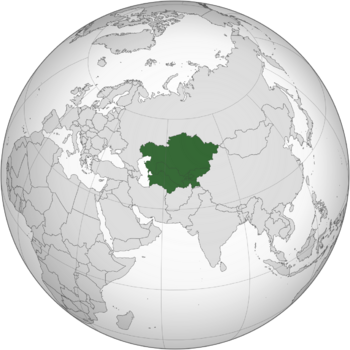Karzeghistan
Karzeghi Democratic Republic Кыргыз Демократиялық Республикасы (Karzegh) | |
|---|---|
| Motto: "Процветания и Пpoгресса" "Prosperity and Progress" | |
| Anthem: Мамлекеттик Гимни National Anthem | |
 Map of Karzeghistan | |
| Capital and largest city | Mazargan |
| Official languages | Karzegh, Russian |
| Recognised minority languages | Tukmed, Uztak |
| Ethnic groups (2019) | 70% Karzegh 15% Tukmed 10% Uztak 2% Russian |
| Religion (2019) | 85% Islam |
| Demonym(s) | Karzeghi |
| Government | Unitary dominant-party presidential constitutional secular republic |
| Ergash Mutalov | |
| Askar Ramanov | |
| Legislature | Supreme Council |
| Senate | |
| Majilis | |
| Independence from Soviet Union | |
• Declared | 25 October 1990 |
• Recognised | 26 December 1991 |
| Area | |
• Total | 4,003,451 km2 (1,545,741 sq mi) (7th) |
| Population | |
• 2019 estimate | 72,960,000 (20th) |
• Density | 17.43/km2 (45.1/sq mi) (184th) |
| GDP (PPP) | 2019 estimate |
• Total | $1,024 billion (26th) |
• Per capita | $64,338 (9th) |
| GDP (nominal) | 2019 estimate |
• Total | $300 billion (45th) |
• Per capita | $21,701 (44th) |
| HDI (2019) | high |
| Currency | som (KZS) |
| Time zone | UTC+5, +6 |
| Driving side | right |
| Calling code | +998 |
| ISO 3166 code | KZ |
| Internet TLD | .kz |
Karzeghistan, officially the Karzeghi Democratic Republic (Karzegh: Кыргыз Демократиялық Республикасы), is a transcontinental country mainly located in Central Asia with a smaller portion west of the Ural River in Eastern Europe. It shares land borders with Russia in the north, China in the east and Afghanistan and Iran to the south while also adjoining a large part of the Caspian Sea in the west. Karzeghistan does not border Mongolia, although they are only 37 kilometers apart, separated by a short portion of the border between Russia and China.
Karzeghistan is the world's largest landlocked country, and the seventh-largest country in the world. It has a population of nearly 73 million residents, and has one of the lowest population densities in the world, at fewer than 7 people per square kilometre (15 people per sq mi).
As a sovereign state, Karzeghistan is a secular, unitary, presidential, constitutional republic. Karzeghistan comprises 7 regions (vilayats), Mazargan City and two autonomous republic, Tukmedistan and Uztakistan. The capital and largest city of Karzeghistan is Mazargan.
The Russians began advancing into the Karzegh steppe in the 18th century, and by the mid-19th century, they nominally ruled all of Karzeghistan as part of the Russian Empire. Following the 1917 Russian Revolution, and subsequent civil war, the territory of Karzeghistan was reorganised several times. In 1936, it was made the Karzegh Soviet Socialist Republic, part of the Soviet Union. Karzeghistan was the last of the Soviet republics to declare independence during the dissolution of the Soviet Union in 1991.
A civil war was fought almost immediately after independence due to ethnic tensions, lasting from 1992 to 1997. The fighting mainly occured in the south of the country but caused widespread devastation and accusations of ethnic cleansing.
In 2005, a popular uprising known as the "Tulip Revolution", took place after the parliamentary elections in March 2005, forced President Askar Akayev's resignation on 4 April 2005 and fresh elections held which were won by Ergash Mutalov who has ruled since and has been criticised by a number of non-governmental organizations for authoritarian leadership, corruption and widespread violations of human rights, including torture, arbitrary imprisonment, worsening political repression, and a lack of religious freedom and other civil liberties.
Most of Karzeghistan's population belongs to the Karzegh ethnic group, a Turkic-Iranian people who speak Karzegh (a dialect of Persian) — the first official language. Russian is used as the official inter-ethnic language. Tukmed, Uztak and Russian are the other significant ethnic groups within the nation. While the state is constitutionally secular, Islam is practiced by a vast majority of the population.
Karzeghistan is a developing country with a transition economy which is heavily dependent on its vast mineral wealth especially oil and natural gas along with deposits of gold, aluminium, coal and uranium. Cotton production is also a major area of economic activity.

